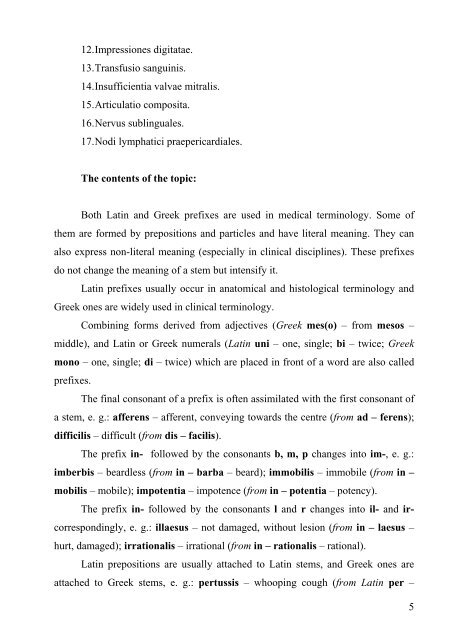- Page 1 and 2:
Ministry of Health of Ukraine The h
- Page 3 and 4:
and sounds, diphthongs and monophth
- Page 5 and 6:
2. Latin has become the language of
- Page 7 and 8:
The pronunciation of consonants and
- Page 9 and 10:
pyr my(o) myk glyk -ylcycl - points
- Page 11 and 12:
3. Caries, acidum, bacca, cor, corn
- Page 13 and 14:
Ministry of Health of Ukraine The h
- Page 15 and 16:
Term Definition Stress Penult Antep
- Page 17 and 18:
The penult is short: b) if a vowel
- Page 19 and 20:
Ministry of Health of Ukraine The h
- Page 21 and 22:
the description of declensions, the
- Page 23 and 24:
Graph № 1 The structure of anatom
- Page 25 and 26:
Graph № 5 Finding of the stem of
- Page 27 and 28:
Ministry of Health of Ukraine The h
- Page 29 and 30:
4.1. The list of basic terms, param
- Page 31 and 32:
The feminine adjectives (-a) are de
- Page 33 and 34:
dens cariosus - carious tooth 3) re
- Page 35 and 36:
8. Cutis sicca h) interosseal edge
- Page 37 and 38:
The actuality of the topic: Each an
- Page 39 and 40:
The adjective agreed with the noun
- Page 41 and 42:
tunica mucosa vesicae felleae - a m
- Page 43 and 44:
Ministry of Health of Ukraine The h
- Page 45 and 46:
stem, ending), to be able to determ
- Page 47 and 48:
1. Decline: a) costa vera (true rib
- Page 49 and 50:
Abl. -is male persons) Graph № 2
- Page 51 and 52:
+ ending ab-ductor fove-ola inter-
- Page 53 and 54:
aqua cellula femĭna forma glandǔl
- Page 55 and 56:
a) sinister, tra, trum - scapula, a
- Page 57 and 58:
Ministry of Health of Ukraine The h
- Page 59 and 60:
4. The tasks for independent work d
- Page 61 and 62:
except in the dative and the ablati
- Page 63 and 64:
Neuter gender cavum, i n - cavity;
- Page 65 and 66:
ectum, i n venenum, i n proct- toxi
- Page 67:
1) diameter transverses; 2) brachiu
- Page 70 and 71:
The actuality of the topic: The con
- Page 72 and 73:
4) palatum osseum 5) fossa incisiva
- Page 74 and 75:
joint compound processus, us m proc
- Page 76 and 77:
fibrous rings mucous membrane lymph
- Page 78 and 79:
10). Xerorhinia j) Slow movement 11
- Page 80 and 81:
The actuality of the topic: The lis
- Page 82 and 83:
Term Alphabet Diphthong Phoneme Pho
- Page 84 and 85:
2. Translate the terms from Latin i
- Page 86 and 87:
organon, i n Task № 2. Translate
- Page 88 and 89:
1) ophtalmoscopia, 2) hystologia, 3
- Page 90 and 91:
The actuality of the topic: In the
- Page 92 and 93:
4.2. The theoretical questions to t
- Page 94 and 95:
The case endings of the vowel type
- Page 96 and 97:
Test № 3. Fill in the table. Case
- Page 98 and 99:
Ministry of Health of Ukraine The h
- Page 100 and 101:
4. The tasks for independent work d
- Page 102 and 103:
The agreement of the 1 st group adj
- Page 104 and 105:
1) margo, inis . . .; 2) os, ossis
- Page 106 and 107:
Ministry of Health of Ukraine The h
- Page 108 and 109:
4.1. The list of basic terms, param
- Page 110 and 111:
-es (imparisyllabic) -ĕtis -edis p
- Page 112 and 113:
Task № 2. Translate into Latin, l
- Page 114 and 115:
Ministry of Health of Ukraine The h
- Page 116 and 117:
3. Basic knowledge, skills, habits,
- Page 118 and 119:
1) The ulcer of the duodenum and st
- Page 120 and 121:
Latin word Greek stem Meaning abdom
- Page 122 and 123:
neutrum. a) masculinum; b) femininu
- Page 124 and 125:
Ministry of Health of Ukraine The h
- Page 126 and 127:
3. Basic knowledge, skills, habits,
- Page 128 and 129:
4. Analyse the terms, translate the
- Page 130 and 131:
The neuter gender pancreas, ătis n
- Page 132 and 133:
Task № 1. Form Gen. sing. and det
- Page 134 and 135:
Literature Basic. Demchenko O., Zak
- Page 136 and 137:
The actuality of the topic: The ter
- Page 138 and 139:
2. Translate the terms into Latin:
- Page 140 and 141:
Dat. Acc. Abl. vasi vas vase vasis
- Page 142 and 143:
Ministry of Health of Ukraine The h
- Page 144 and 145:
4. The tasks for independent work d
- Page 146 and 147:
Singularis Nom. different Gen. -is
- Page 148 and 149:
E. g. Positivus Stem Comparativus l
- Page 150 and 151:
2) recens, ntis (milk, air, flower,
- Page 152 and 153:
Ministry of Health of Ukraine The h
- Page 154 and 155:
4.1. The list of basic terms, param
- Page 156 and 157:
Nom. -us -ua Gen. -uum -uum Dat. -i
- Page 158 and 159:
Dat. faciei diei faciebus diebus Ac
- Page 160 and 161:
Variants of the answers: a) Nom.sin
- Page 162 and 163:
Ministry of Health of Ukraine The h
- Page 164 and 165:
8. To know how to agree adjectives
- Page 166 and 167:
The agreed attribute so on. The var
- Page 168 and 169:
Task 4 (2 points). The declension o
- Page 170 and 171:
1) ovalis; 2) simplex; 3) sinistrum
- Page 172 and 173:
The actuality of the topic: The ver
- Page 174 and 175:
4. In what forms are Latin verbs wr
- Page 176 and 177:
N. B. To find the present stem, it
- Page 178 and 179:
Signare I Signa (mark) (to mark) Si
- Page 180 and 181:
Ministry of Health of Ukraine The h
- Page 182 and 183:
4.1. The list of basic terms, param
- Page 184 and 185:
1. The names of the acids with high
- Page 186 and 187:
Test № 1. The names of acids with
- Page 188 and 189:
Ministry of Health of Ukraine The h
- Page 190 and 191:
4.1. The list of basic terms, param
- Page 192 and 193:
3. alg- algos (Greek), -pain anaest
- Page 194 and 195:
17. suffixes nitrogen the presence
- Page 196 and 197:
Demchenko O., Zakaliuzhnyi M. The L
- Page 198 and 199:
The actuality of the topic: Medicin
- Page 200 and 201:
included the problems of medicine,
- Page 202 and 203:
Sometimes the same plant can have t
- Page 204 and 205:
Ministry of Health of Ukraine The h
- Page 206 and 207:
1) Recipe: Sulfuris depurati 2,0 Gl
- Page 208 and 209:
a) the names of plants’ parts (ro
- Page 210 and 211:
c) solutiones Iodi spirituosae; c)
- Page 212 and 213:
The actuality of the topic: Medicin
- Page 214 and 215:
4.3. The practical works (tasks) wh
- Page 216 and 217:
Medications used for injections (fo
- Page 218 and 219:
Of salicylic acid 5,0 Of turpentine
- Page 220 and 221:
Literature Basic. Demchenko O., Zak
- Page 222 and 223: The actuality of the topic: The med
- Page 224 and 225: Write every word in the vocabulary
- Page 226 and 227: According to the way of administrat
- Page 228 and 229: A lot of drug preparations are admi
- Page 230 and 231: Besides the precipitated calcium ca
- Page 232 and 233: Test № 1. The maximum mass of the
- Page 234 and 235: The actuality of the topic: The med
- Page 236 and 237: 3. Rp.: Acidi salicylici 1,0 Hydrar
- Page 238 and 239: thicker and stiffer, that penetrate
- Page 240 and 241: utter. Тhе patient should insert
- Page 242 and 243: Ministry of Health of Ukraine The h
- Page 244 and 245: Drop Tincture Extract Infusion Deco
- Page 246 and 247: Da. Signa: one tablespoon 2 times a
- Page 248 and 249: Dental drops are usually officinal
- Page 250 and 251: Mixture is a liquid medicinal form
- Page 252 and 253: Misce, fiat linimentun Da. Signa: b
- Page 254 and 255: Ministry of Health of Ukraine The h
- Page 256 and 257: 4.2. The theoretical questions to t
- Page 258 and 259: āā ac, acid. amp. aq. aq. destill
- Page 260 and 261: 3. Take: Of camphor oil 20 % 1 ml G
- Page 262 and 263: Demchenko O., Zakaliuzhnyi M. The L
- Page 264 and 265: The actuality of the topic: The bet
- Page 266 and 267: It has turned out historically that
- Page 268 and 269: 7) articulatio g) dacry- 8) manus h
- Page 270 and 271: The actuality of the topic: The wor
- Page 274 and 275: concorcocontradedidise-, exextra- a
- Page 276 and 277: trans- 2) next, above in rank throu
- Page 278 and 279: e) supra- Literature Basic. Demchen
- Page 280 and 281: The actuality of the topic: The wor
- Page 282 and 283: 9. Tractus mesencephalicus nerve tr
- Page 284 and 285: dia- dys- ec-, ecto- through, apart
- Page 286 and 287: pro- syn-, sym- a) beside, near b)
- Page 288 and 289: Ω ω omega o (long) In the Old Gre
- Page 290 and 291: Pharmaceutical terms Anaesthesinum;
- Page 292 and 293: Ministry of Health of Ukraine The h
- Page 294 and 295: Clinical term Affixation Word combi
- Page 296 and 297: dermatologia (derma, atis - skin; l
- Page 298 and 299: Test № 2. Find the Latin term cor
- Page 300 and 301: Ministry of Health of Ukraine The h
- Page 302 and 303: Suffix A word-forming morpheme, a p
- Page 304 and 305: Latin noun Stem of the Greek noun E
- Page 306 and 307: organ: Choose the term in which the
- Page 308 and 309: Ministry of Health of Ukraine The h
- Page 310 and 311: Write down and memorize the vocabul
- Page 312 and 313: Basic. Demchenko O., Zakaliuzhnyi M
- Page 314 and 315: The actuality of the topic: The lis
- Page 316 and 317: 4. The tasks for independent work d
- Page 318 and 319: 4.2. The theoretical questions to t
- Page 320 and 321: prefix: Task 6 (1 marks). The names
- Page 322 and 323:
) gall-bladder; c) calix and bladde
- Page 324:
Literature Basic. Demchenko O., Zak
















